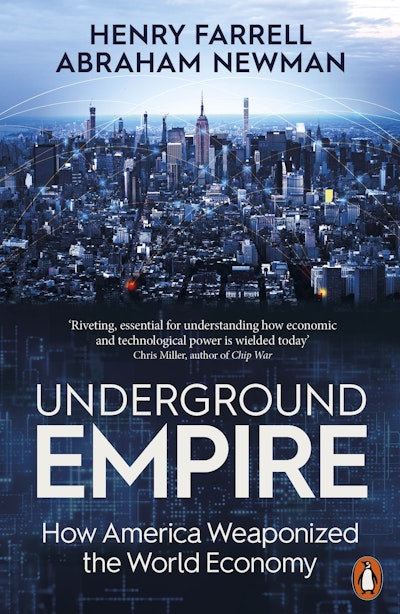- Published: 3 December 2024
- ISBN: 9781802062076
- Imprint: Penguin Press
- Format: Paperback
- Pages: 288
- RRP: $28.99
Underground Empire
How America Weaponized the World Economy
- Published: 3 December 2024
- ISBN: 9781802062076
- Imprint: Penguin Press
- Format: Paperback
- Pages: 288
- RRP: $28.99
Farrell and Newman's book is like an MRI or CT scan of recent world history, giving us a new and startling image of the global body politic, as clear as an X-ray. Cognitive mapping takes on a new aspect with their analysis, as they shift from the technological to the historical, showing both how this new nervous system of world power came to be, and how it could be put to better use than it is now. Given the intertwined complexities of our very dangerous polycrisis, we need their insights
Kim Stanley Robinson, author of THE MINISTRY FOR THE FUTURE
The sharpest and most striking analysis I've seen in years of the state the world's in, cunningly disguised as a user-friendly business book
Francis Spufford, author of GOLDEN HILL
Underground Empire is an astonishing explanation of how power really works. From fiber optic cables to the financial system, Farrell and Newman show how the networks that knit us together are also powerful coercive tools, providing a subtle and revelatory account of how the United States learned to weaponize its dominance of the world order's plumbing. A riveting read, essential for understanding how economic and technological power is wielded today
Chris Miller, author of CHIP WAR
Henry Farrell and Abraham Newman paint a persuasively alarming picture of just how American power has become entrenched deep in the plumbing of the world economy. Underground Empire is a passionate plea for restraint and reform in the face of a world burdened by all kinds of geopolitical dangers
Helen Thompson
Underground Empire tells a riveting story about the deep forces that have shaped our present moment. The book is a portrait not of a single protagonist or event, but rather a system that shapes much of the world today: a web of dollars and data that has, half accidentally, given the United States a new kind of geopolitical control over both its enemies and allies. It is history written in its most powerful form: a view of the recent past that gives us a new lens to better discern our future
Steven Johnson, author of HOW WE GOT TO NOW
Captivating… The stuff of thrillers
The Financial Times
If you want to understand where the world economy has been and where it may be headed, you need to read this book
Dani Rodrik, Ford Foundation Professor of International Political Economy, X (Twitter handle)
The publication of Underground Empire could not be more timely. Henry Farrell and Abraham Newman offer an important corrective to a dominant narrative in US foreign policy circles.
Emily Jones, the TLS
We live in a digital global economy, but who controls its wiring and plumbing? Underground Empire shows how American power travels along fibre-optic cables, server farms, internet and financial infrastructure, intellectual property, and technological expertise.
The Times of India
An important new book by Henry Farrell and Abraham Newman, two US academics. There are several reasons to read their book: it is accessible, it is engaging and it is refreshingly concise. But most of all, they get to the heart of how power really works in a globalized economy.
Neil Shearing, Chatham House
The international relations experts Henry Farrell and Abraham Newman recently published Underground Empire: How America Weaponized the World Economy, a revelatory book that describes how modern globalization — which creates far more complex forms of interdependence than traditional international trade — has put America at the heart of an international web of surveillance and control
Paul Krugman, the New York Times
The world economy, from finance to technology, runs on networks. Those at the center of the networks control – often subtly and invisibly – what happens within them. More often than not, it is the US that has had that privilege. Anyone who wants to understand how the world economy got to where it is today, and how it will probably evolve, should read this book
Dani Rodik, PS Read More Newsletter
Farrell and Newman write fluidly and grippingly, and not just by the standards of international relations theorists
Joshua Keating, The Washington Post
Revelatory… the underground empire deserves the same kind of sophisticated thinking once devoted to nuclear rivalries… by highlighting how the nature of global power has changed, the book makes an enormous contribution to the way analysts think about influence
Paul Krugman, Foreign Affairs



